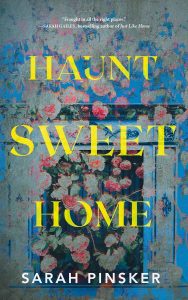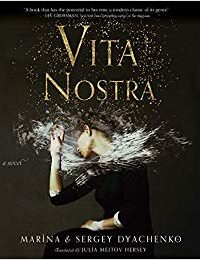Haunt Sweet Home by Sarah Pinsker: Review by Gary K. Wolfe
 Haunt Sweet Home, Sarah Pinsker (Tordotcom 978-1-250-33026-0, $20.99, 170pp, hc) September 2024.
Haunt Sweet Home, Sarah Pinsker (Tordotcom 978-1-250-33026-0, $20.99, 170pp, hc) September 2024.
I seem to have found myself reading a number of haunted house novels in the last year or so, and it’s always fascinating to watch how authors still find ways to ring new changes on a template that goes back to the earliest Gothic novels. In Haunt Sweet Home, Sarah Pinsker’s witty approach is to focus on fake haunted houses, and on the fascination people seem to have with those paranormal TV shows in which a team of ‘‘investigators’’ sets up a bunch of ersatz electronic equipment in a supposedly haunted house and then reliably, week after week, fail to find a ghost. (The few episodes I’ve watched always remind me of Lucy holding the football for an endlessly trusting audience of Charlie Browns.) In this case, the program is called ‘‘Haunt Sweet Home,’’ in which new homeowners invite such a team to look for ghosts in their vintage house – but unbeknownst to them, the investigators secretly provide the ghosts, through elaborate theatrical special effects. Franchise-style movie conventions might seem to dictate that these exploiters get their comeuppance when they stumble upon an actual haunting, but Pinsker is far too sophisticated and character-driven a writer to let herself get bottled up in that formula.
Instead, the focus is on her narrator Mara, a smart and observant twentysomething who nevertheless seems to have raised aimlessness to an art – desultory jobs at hardware stores or coffee shops, repeated failed attempts at community college – despite coming from a musical family and a grandmother who was a talented woodcarver. Her cousin Jeremy, on the other hand, is the family celebrity: he’s the host of ‘‘Haunt Sweet Home’’. When the two of them meet at a family Thanksgiving gathering, he offers her a job as production assistant, and she soon finds herself on location at an old farmhouse in Massachusetts, involved in everything from running trivial errands to operating a hidden smoke machine as part of the show’s fakery, and even accidentally discovering a hidden cemetery near the house. As Mara meets a colorful cast of mostly cynical and preoccupied producers, photographers, and technicians, she eventually finds herself with an unexpected assistant of her own, who introduces herself as Jo, a ‘‘floater’’ who works either with the day or night crews as needed. When the need arises for some particular sounds to add to the creepiness of the episode, Jo turns out to have a pretty disturbing talent, and – of course – to be more than she seems.
Pinsker occasionally intersperses bits of transcripts from the finished program between chapters, nailing with a sharp satirical eye the portentous, kitschy narration, and false camaraderie of reality TV, and since it takes a while for Mara’s narration to catch up with the glimpses of the show we see in these transcripts, it also takes a while for the rather elegant and clever narrative structure to reveal itself; even the grandmother’s woodcarving skills and that hidden cemetery turn out to be bits of foreshadowing. While there may not be actual haunted houses in Haunt Sweet Home (though there’s a fillip at the end that leaves the door open a crack), there’s certainly a haunted character in Mara, and her sometimes-bumpy quest to discover herself as having both value and purpose, whether or not aided by uninvited supernatural forces, is consistently compelling.
Gary K. Wolfe is Emeritus Professor of Humanities at Roosevelt University and a reviewer for Locus magazine since 1991. His reviews have been collected in Soundings (BSFA Award 2006; Hugo nominee), Bearings (Hugo nominee 2011), and Sightings (2011), and his Evaporating Genres: Essays on Fantastic Literature (Wesleyan) received the Locus Award in 2012. Earlier books include The Known and the Unknown: The Iconography of Science Fiction (Eaton Award, 1981), Harlan Ellison: The Edge of Forever (with Ellen Weil, 2002), and David Lindsay (1982). For the Library of America, he edited American Science Fiction: Nine Classic Novels of the 1950s in 2012, and a similar set for the 1960s. He has received the Pilgrim Award from the Science Fiction Research Association, the Distinguished Scholarship Award from the International Association for the Fantastic in the Arts, and a Special World Fantasy Award for criticism. His 24-lecture series How Great Science Fiction Works appeared from The Great Courses in 2016. He has received six Hugo nominations, two for his reviews collections and four for The Coode Street Podcast, which he has co-hosted with Jonathan Strahan for more than 300 episodes. He lives in Chicago.
This review and more like it in the August 2024 issue of Locus.
 While you are here, please take a moment to support Locus with a one-time or recurring donation. We rely on reader donations to keep the magazine and site going, and would like to keep the site paywall free, but WE NEED YOUR FINANCIAL SUPPORT to continue quality coverage of the science fiction and fantasy field.
While you are here, please take a moment to support Locus with a one-time or recurring donation. We rely on reader donations to keep the magazine and site going, and would like to keep the site paywall free, but WE NEED YOUR FINANCIAL SUPPORT to continue quality coverage of the science fiction and fantasy field.
©Locus Magazine. Copyrighted material may not be republished without permission of LSFF.








